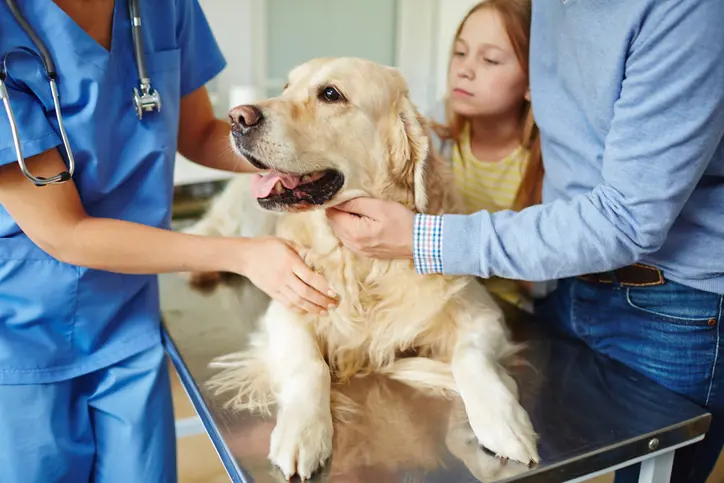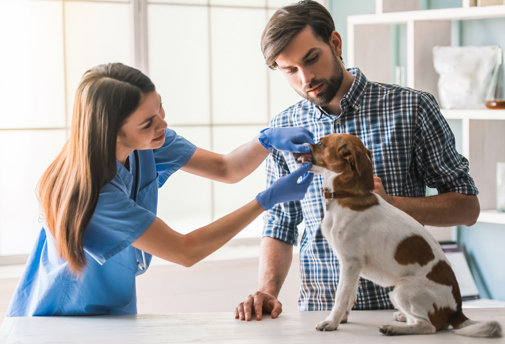What is xylitol poisoning in dogs?
22nd October, 2020

It's a familiar scene... you sit down with a snack, curl up in front of the TV and a pair of big, brown eyes looks up at you, hoping to share.
Few of us can resist treating our dogs, but some foods we enjoy can be harmful to pets. It's important to know what they are, or you might end up taking an unscheduled (not to mention expensive) trip to the vet.
One surprising food that is toxic to dogs is a sweetener called xylitol, which is used as an ingredient in a wide range of everyday products.
What foods contain xylitol?
Though it's completely safe in humans and considered a good substitute for sugar, xylitol is highly dangerous for canines.
Products containing xylitol include:
-
sugar-free chewing gum and nicotine gum
-
toothpaste and mouthwash
-
vitamin supplements
-
sweets
-
baked goods such as biscuits and bread
-
some peanut butter brands
A naturally occurring sugar alcohol, xylitol is also found in berries, mushrooms and lettuce.
Products can have varying levels of xylitol in them, but even small amounts can cause serious harm to your pet.
So, as well as remembering not to share any of these products with your dog, make sure you keep them out of reach or safely stored away.
That includes not leaving packs of chewing gum lying around the home or in pockets or bags that your dog could raid.
Depending on the concentration of xylitol and size of the dog, just one stick of chewing gum is enough to be toxic and make your pet critically ill, Blue Cross warns.
It's also best to avoid giving your dog any home baking, especially if sweeteners have been used.
Xylitol can also be toxic to other animals, so keep it away from all pets in your household.

What is this type of poisoning?
Xylitol is absorbed into the bloodstream of dogs very rapidly. It can cause hypoglycaemia (low blood sugar levels) as the animal’s pancreas confuses it with real sugar, making it release more insulin.
The insulin then removes the real sugar in the body, leading to plummeting blood sugar levels.
Further complications can include hypokalemia (deficiency of potassium) and hypophosphatemia (low phosphate levels), as well as liver damage.
According to Blue Cross, more than 250 cases of xylitol poisoning were reported to the UK's Veterinary Poisons Information Service in 2016 – most of these were down to dogs getting their paws on chewing gum.
At least one of these pets sadly died, and it's likely that there were many more cases of xylitol poisoning that went unreported.
Signs of poisoning
After your dog has ingested xylitol, it will be pretty obvious after half an hour. Look for tell-tale signs such as:
-
vomiting
-
lethargy
-
weakness
-
wobbly legs or problems walking
-
seizures and tremors
-
collapse
However, signs of poisoning can sometimes be delayed by up to 12 hours. So if you believe your dog may have consumed xylitol you should never wait for symptoms to appear before seeking veterinary help, as this could put your pet’s life at risk.
What should I do if my dog has eaten xylitol?
As even small amounts can be fatal, early veterinary intervention is crucial.
If you suspect that your dog has eaten something containing xylitol, get them to the vets as soon as you can. If possible, take the packaging of the product that your dog has consumed.
As Blue Cross explains, if a drop in blood sugar levels is prevented or brought under control quickly, the prognosis is good.
Don’t put off going to the vets as delays can cause further damage, and increase the likelihood of xylitol poisoning becoming fatal.
Remember that insurance for your dog can help pay the bills if your four-legged friend ever needs urgent veterinary care. And with dog insurance from Purely Pets, you get access to a 24-hour Vet Helpline for all your canine health concerns.

How is xylitol poisoning treated?
After eating xylitol in any form, dogs benefit from quick and aggressive treatment.
What type of treatment they get will depend on a number of factors such as how much xylitol they’ve eaten, how long ago it happened and the overall state of their health and liver beforehand.
If you get to the vets early enough, your vet may be able to induce vomiting to get the product out of your dog’s system and this will minimise the chances of any serious damage.
After this, treatment usually involves giving glucose via an intravenous drip to regulate the dog's blood sugar levels.
Intravenous fluid therapy can also help correct potassium and phosphate levels and provide liver protectants, along with antioxidants, vitamins C, E and K1 and antibiotics.
If the liver has been damaged, this will more than likely require expensive emergency treatment – something that could be covered by your dog insurance.
Your dog will be allowed home once the veterinary team feels that the liver is functioning normally and all blood markers are at the levels they should be.
At home, you will need to provide a quiet resting place for your dog to recover, and where you can keep a watchful eye on your poorly pup. Call your vet if you have concerns about the progress of your dog's recovery.
Dog insurance from Purely Pets
If your dog needs emergency veterinary treatment, it often comes with an eye-wateringly large bill – and that's where specialist pet insurance comes in.
With Purely Pets, you know that you’ve got support to help you deal with emergency situations.
Our 15 levels of lifetime cover include vets’ fees ranging from £1,000 to £15,000 per year, depending on the policy, and you can choose a low excess starting from just £60.
Policyholders can contact our free 24-hour Vet Helpline at any time.
The service is provided by The Vet Connection and all calls are handled by RCVS (Royal College of Veterinary Surgeons) registered veterinary nurses who have a minimum of three years' practical experience.
Our online 'Manage My Policy' portal gives you access to your policy 24 hours a day, giving you greater flexibility to manage your policy at a time that suits you.
Get a quote from Purely Pets today!
Policy benefits, features and discounts offered may very between insurance schemes or cover selected and are subject to underwriting criteria. Information contained within this article is accurate at the time of publishing but may be subject to change.
Helpful Pages
Recent Posts
Pet Insurance Quote
- 98% claims paid *
- Claims paid directly to vets
- 24/7 vet video consultations
- Interest free monthly payments




